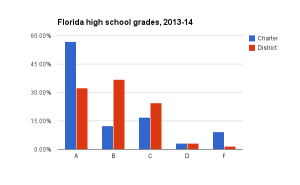
Dozens of Florida charter schools withstood tougher high school grading rules and kept their top marks in a new state accountability report released today.
For both charter and district schools, there were more F’s and fewer A’s in Thursday’s annual release of high school grades than a year ago. Elementary and middle school grades came out earlier this year.
In what has become a familiar pattern, charters were more likely than district schools to land at either the highest or lowest ends of the grading scale, and less likely to receive B’s and C’s.
Just over 56 percent of charter high schools earned A’s for the 2013-14 school year, a decline of about 10 percentage points from a year earlier. The percentage of A-rated district high schools fell to 32 percent, from nearly 48 percent a year earlier.
All but four of the 39 charter high schools that received A’s in 2013 held on to their grades. Two more rose to A’s this year, including Marco Island Academy in Collier County, which climbed all the way from a D.
One Central Florida charter school – Acclaim Academy of Florida Inc. in Osceola County – faces automatic closure after receiving its second-consecutive F.
The declines came despite another round of good news for the state’s high schools: Florida’s statewide graduation rate climbed another half a percentage point last school year. It now tops 76 percent, an all-time high.
On a conference call with reporters, Education Commissioner Pam Stewart said this reflects an upward ratcheting of state grading standards. Last year’s strong performance triggered an automatic toughening of the grading scale for high schools.
The state is now moving to new standards and new tests, which will bring another overhaul of the formula used to calculate the letter grades expected to be issued next fall. While they will be measured by a different yardstick, and the consequences of school grades will be suspended for one year of transition, Stewart predicted the higher standards would lead to better results in the long run.
“Historically that is what has happened,” she said. “As we’ve raised the bar, (student) performance has adjusted and moved up.”


